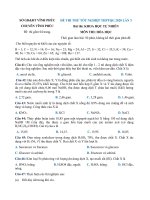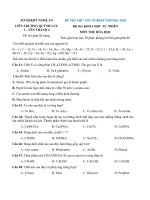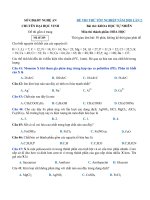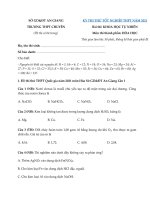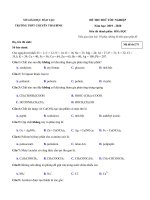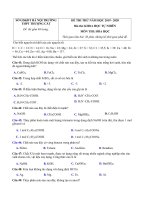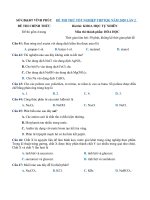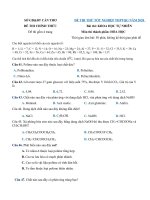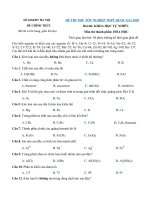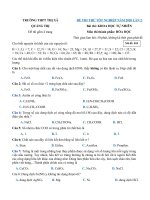Tải Đề thi thử THPT Quốc Gia môn tiếng Anh năm 2020 số 32 - Đề thi tốt nghiệp THPT 2020 môn Anh có đáp án
Bạn đang xem bản rút gọn của tài liệu. Xem và tải ngay bản đầy đủ của tài liệu tại đây (133.16 KB, 9 trang )
<span class='text_page_counter'>(1)</span><div class='page_container' data-page=1>
<b>ĐỀ THI THỬ THPTQG MÔN TIẾNG ANH</b>
<b>NĂM 2020 CÓ ĐÁP ÁN</b>
<b>I. Mark the letter A, B, C, or D on your answer sheet to indicate the word whose underlined</b>
<i><b>part differs from the other three in pronunciation in each of the following questions. </b></i>
<b>Question 01. A. </b><i><b>encourage</b></i> <b>B. </b><i><b>underground</b></i> <b>C. outstanding</b> <b>D. </b><i><b>counterpart </b></i>
<b>Question 02. A. </b><i><b>details</b></i> <b>B.</b><i><b> photographs</b></i> <b>C. </b><i><b>economics</b></i> <b>D. </b><i><b>applicants</b></i>
<b>II. </b><i><b>Read the following passage and mark the letter A, B, C, or D on your answer sheet to</b></i>
<i><b>indicate the correct word or phrase that best fits each of the numbered blanks. </b></i>
Shopping lists, super-market hopping and an increased sensitivity to shelf prices are
among the signs that Greek consumers in these times of financial crisis are changing their
habits when it comes to how they shop, what they spend and what they buy. These are the
most recent findings of an annual research project carried out by the Athens University of
<b>Economics and Business on a (03)________ sample of 1,928 households.</b>
One of the most significant changes in this year’s report is that 93.3 percent of
<b>(04)________ said that they have already made up their (05)________ about what they will</b>
buy in advance of going shopping. Random purchases are becoming rarer: in the past, unable
to resist the temptation of the colourful shelf displays, shoppers would happily buy things from
the supermarket they had not intended to get when they set out. But at a time when money is
<b>short, people tend to avoid buying anything but the bare essentials. (06)________, there is</b>
much less waste than in the past when people felt more carefree.
<b>Another important finding is that only 60 percent of those (07)________ have made</b>
mental or written shopping lists specifically intend to buy particular well-known brand names
when they get to the supermarket. Cheaper, less well-known brands or local supermarket
<i>products, are becoming more popular. </i>
<i>(Adapted From Exam Preparation In School, Level (B1&B2) Exam In English)</i>
<b>Question 03. A. </b>random <b>B. </b>selective <b>C.</b> careless <b>D. </b>conscious
<b>Question 04. A. </b>respondents <b>B. </b>respondence <b>C. </b>responses <b>D. </b>responds
<b>Question 05. A. </b>minds <b>B. </b>thoughts <b>C. </b>spirits <b>D. </b>heads
<b>Question 06. A. </b>As a result <b>B. </b>On the other hand <b>C.</b> In addition <b>D. </b>However
</div>
<span class='text_page_counter'>(2)</span><div class='page_container' data-page=2>
<b>III. </b><i><b>Mark the letter A, B, C, or D on your answer sheet to indicate the sentence that best</b></i>
<i><b>combines each pair of sentences in the following questions.</b></i>
<b>Question 08. Fossil fuels pose an environmental hazard. There is also a pressing need to find</b>
<i>an alternative energy source that is renewable.</i>
<b>A. </b>Not only do fossil fuels pose an environmental hazard but there is also a pressing need
to find an alternative energy source that is renewable.
<b>B. </b>Fossil fuels pose an environmental hazard; therefore, there is also a pressing need to
find an alternative energy source that is renewable.
<b>C. </b>Although fossil fuels pose an environmental hazard, there is also a pressing need to
find an alternative energy source that is renewable.
<b>D. </b>Fossil fuels pose an environmental hazard, but there is also a pressing need to find an
alternative energy source that is renewable.
<b>Question 09. The author deeply regrets inconvenience the error may have caused to readers of the</b>
<i>journal.</i>
<b>A. </b>The author wishes he hadn’t made any error to cause inconvenience to readers of the
journal.
<b>B. </b>The author regretted having caused inconvenience to readers of the journal.
<b>C. </b>The author regrets not having caused inconvenience to readers of the journal.
<b>D. </b>Only if the author may not have caused to readers of the journal.
<b>IV. Mark the letter A, B, C, or D on your answer sheet to indicate the word(s) CLOSEST in</b>
<i><b>meaning to the underlined word(s) in each of the following questions. </b></i>
<b>Question 10. When their rent increased from $200 to $400 a month, they protested</b> against
<i><b>such a tremendous increase.</b></i>
<b>A. huge</b> <b>B. tiring</b> <b>C. light</b> <b>D. difficult</b>
<b>Question 11. </b><i><b>The burglar has got cold feet, when the dog started barking.</b></i>
<b>A. </b>frightened <b>B. </b>excited <b>C. </b>angry <b>D. </b>surprised
<b>V. Mark the letter A, B, C, or D on your answer sheet to indicate the sentence that is closest</b>
<i><b>in meaning to each of the following questions.</b></i>
<b>Question 12. </b><i>"Would you please not smoke in the car?" the taxi driver said.</i>
<b>A. </b>The taxi driver didn’t allow the customer to smoke in the car.
<b>B. </b>The taxi driver asked his customer to not smoke in the car.
</div>
<span class='text_page_counter'>(3)</span><div class='page_container' data-page=3>
<b>D. </b>The taxi driver asked his customer where he could smoke in the car or not.
<b>Question 13. She made a mistake of taking Pete’s bike without his permission.</b>
<b>A. </b>She should have asked Pete for his permission before taking his bike.
<b>B. </b>She should have taken Pete’s bike without his permission.
<b>C. </b>She mustn’t have taken Pete’s bike without his permission.
<b>D. </b>She needn’t have taken Pete’s bike before he permitted her to do that.
<b>Question 14. You may find it more satisfying to listen to Moby Grape’s early albums rather than this</b>
<i>anthology.</i>
<b>A. </b><i><b>It is not so satisfying to listen to this anthology as Moby Grape’s early albums.</b></i>
<b>B. </b>Instead of listening to Moby Grape’s early albums, you should be satisfied with this
anthology.
<b>C. </b>Moby Grape’s early albums are the most satisfying anthology in the world.
<b>D. </b>No other anthology is more satisfying than Moby Grape’s early albums.
<b>VI. </b><i><b>Read the following passage and mark the letter A, B, C, or D on your answer sheet to</b></i>
<i><b>indicate the correct answer to each of the questions. </b></i>
Robot teachers if you think of the jobs robots could never do, you would probably put
doctors and teachers at the top of the list. It’s easy to imagine robot cleaners and factory
workers, but some jobs need human connection and creativity. But are we underestimating
<i><b>what robots can do? In some cases, they already perform better than doctors at diagnosing</b></i>
illness. Also, some patients might feel more comfortable sharing personal information with a
machine than a person. Could there be a place for robots in education after all?
British education expert Anthony Seldom thinks so. And he even has a date for the robot
takeover of the classroom: 2027. He predicts robots will do the main job of transferring
information and teachers will be like assistants. Intelligent robots will read students’ faces,
<i><b>movements and maybe even brain signals. Then they will adapt the information to each</b></i>
student. It’s not a popular opinion and it’s unlikely robots will ever have empathy and the
ability to really connect with humans like another human can.
</div>
<span class='text_page_counter'>(4)</span><div class='page_container' data-page=4>
Those negative aspects of teaching are something everyone agrees on. Teachers all over
the world are leaving because it is a difficult job and they feel overworked. Perhaps the
question is not ‘Will robots replace teachers?’ but ‘How can robots help teachers?’ Office
workers can use software to do things like organize and answer emails, arrange meetings and
update calendars. Teachers waste a lot of time doing non-teaching work, including more than
11 hours a week marking homework. If robots could cut the time teachers spend marking
homework and writing reports, teachers would have more time and energy for the parts of the
job humans do best.
<i>(Adapted from < />
<b>Question 15. </b>According to the passage, all of the following are mentioned as advantages of
robot teachers EXCEPT________.
<b>A. </b>higher-paid <b>B.</b> unexhausted
<b>C. </b>unpressured <b>D. </b>always ready to work in anywhere
<b>Question 16. </b><i><b>The word ''diagnosing'' in paragraph 1 mostly means________. </b></i>
<b>A. </b>identifying <b>B. </b>discovering <b>C. </b>inventing <b>D. </b>producing
<b>Question 17. </b><i><b>The word “they'' in paragraph 2 refers to________. </b></i>
<b>A. </b>robots <b>B. </b>students <b>C. </b>teachers <b>D. </b>brain signals
<b>Question 18. </b>According to the passage, some parts of the world________.
<b>A. </b>already use robots in teaching jobs <b>B. </b>pay robots to teach
<b>C. </b>use robots to reduce teachers’ marking time<b> D. </b>have a shortage of teachers
<b>Question 19. </b>What is the passage mainly about?
<b>A. </b>Whether robots can work in schools <b>B. </b>What robot teachers are like
<b>C. </b>The importance of robots in the classrooms <b>D. </b>The negative aspects of a robot
teacher
<b>VII. </b><i><b>Mark the letter A, B, C, or D on your answer sheet to indicate the word that differs</b></i>
<i><b>from the other three in the position of primary stress in each of the following questions.</b></i>
<b>Question 20. A. </b>natural <b>B. </b>extinction <b>C.</b> endanger <b>D. </b>important
<b>Question 21. A. </b>swallow <b>B. </b>digest <b>C. </b>above <b>D. </b>enough
<b>VIII. Mark the letter A, B, C, or D on your answer sheet to indicate the correct answer to </b>
<i><b>each of the following questions. </b></i>
<b>Question 22. </b>Attacked by a dog, _________ to the nearest hospital.
</div>
<span class='text_page_counter'>(5)</span><div class='page_container' data-page=5>
<b>C.</b> the little taken <b>D. </b>people were taken the little girl
<b>Question 23. </b>That she is one of the most beautiful women in the world seems_________
although she has never taken part in any beauty contests before.
<b>A. </b>to be widely accepted <b>B. </b>being widely accepted
<b>C. </b>to accept widely <b>D. </b>widely to be accepted
<b>Question 24. </b>You may wonder what on_________ earth has prompted me to ask such a
question, so let me explain.
<b>A. </b>Ø (no article) <b>B. </b>a <b>C. </b>an <b>D. </b>the
<b>Question 25. </b>My son plays basketball for fun. He doesn’t take practice sessions_________.
<b>A. </b>seriously <b>B. </b>clearly <b>C.</b> definitely <b>D. </b>reasonably
<b>Question 26. </b>They have been_________ successful in mobilizing large numbers of
professionals dealing with modern conservation.
<b>A. </b>unexpectedly <b>B. </b>expected <b>C. </b>unexpected <b>D. </b>expectedly
<b>Question 27. </b>Children who do not learn to read before they finish_________ school struggle
throughout the rest of their education.
<b>A. </b>primary <b>B. </b>nursery <b>C. </b>kindergarten <b>D. </b>first
<b>Question 28. </b>His father_________ him to Tyne castle when he was five, to see a Hearts and
Hibs game.
<b>A. </b>took <b>B. </b>was taking <b>C. </b>will take <b>D. </b>has taken
<b>Question 29. </b>This will put more pressure on the city with_________ to traffic and other
problems.
<b>A. </b>respect <b>B. </b>connection <b>C. </b>relation <b>D. </b>concern
<b>Question 30. </b>He blamed the current situation_________ general economic trends within the textile
industry.
<b>A. </b>for <b>B. </b>of <b>C. </b>on <b>D. </b>to
<b>Question 31. </b>If I were rich, I_________ that Ferrari we saw yesterday.
<b>A. </b>would have bought <b>B. </b>would buy <b>C. </b>will buy <b>D. </b>will have bought
<b>Question 32. </b>My company has_________ a new approach to staff meetings. We now have
them standing up!
<b>A. </b>adopted <b>B. </b>addressed <b>C.</b> adapted <b>D. </b>admitted
</div>
<span class='text_page_counter'>(6)</span><div class='page_container' data-page=6>
<b>A. </b>yet <b>B. </b>so <b>C. </b>since <b>D.</b> although
<b>Question 34. </b>The traveler, _________ his things with his practiced hands, began fastening his
coat.
<b>A. </b>having packed <b>B.</b> packed <b>C. </b>to have packed <b>D. </b>being packed
<b>Question 35. </b>It was expected that a gentleman would_________ a polite compliment to a lady
of his acquaintance, but quite another matter to be seen to mean it.
<b>A. </b>pay <b>B. </b>make <b>C. </b>take <b>D. </b>do
<b>IX. </b><i><b>Read the following passage and mark the letter A, B, C, or D on your answer sheet to</b></i>
<i><b>indicate the correct answer to each of the questions.</b></i>
Early mariners gradually developed ways of observing and recording in their journals
their position, the distances and directions they traveled, the currents of wind and water, and
<i><b>the hazards and havens they encountered. The information in these journals enabled them to</b></i>
find their way home and, for them or their successors, to repeat and extend the recorded
voyages. Each new observation could be added to an ever increasing body of reliable
information.
Ship captains and navigators were not concerned about running into other vessels, but as
<i><b>heavy traffic developed along shipping routes, avoiding such collisions became a serious</b></i>
matter. In all fields of navigation, keeping a safe distance between ships moving in different
directions at different speeds became as important as knowing how to reach one’s destination.
<i><b>The larger the ship, the easier it is to see, but the larger a ship, the more time it requires</b></i>
to change its speed or direction. When many ships are in a small area, an action taken by one
ship to avoid colliding with another might endanger a third. In busy seaports, such as Hamburg
and New York, this problem has been solved by assigning incoming and outgoing ships to
separate lanes which are clearly marked and divided by the greatest practical distance.
The speed of jet airplanes makes collision a deadly possibility. Even if two pilots see one
another in time to begin evasive action, their maneuvers may be useless if either pilot
incorrectly predicts the other’s move. Ground-based air traffic controllers assign aircraft to
flight paths that keep airplanes a safe distance from one another.
</div>
<span class='text_page_counter'>(7)</span><div class='page_container' data-page=7>
sea navigation, a schedule has to be met. A single voyage or flight is only one link in a
complicated and coordinated transportation network that carries goods and people from any
starting place to any chosen destination. Modern navigation selects a ship’s course, avoids
collision with other moving ships, minimizes fuel consumption, and follows an established
<i><b>timetable. </b></i>
<i>(Adapted from Peterson’s Master Toefl Reading)</i>
<b>Question 36. </b>Which of the following statements is supported by the passage?
<b>A. </b>Mariners today have to compute more things than those in the past did.
<b>B. </b>Information in mariners’ journals is better than modern navigation techniques.
<b>C. </b>Collisions in the air are more dangerous than those at sea.
<b>D. </b>Air traffic controllers use the same navigation techniques as sea captains.
<b>Question 37. </b><i><b>Which of the choices is closest in meaning to the word “hazards” as used in </b></i>
paragraph 1?
<b>A. </b>dangerous obstacles <b>B. </b>inaccurate navigation
<b>C. </b>whales and large fish <b>D. </b>safe seaports
<b>Question 38. </b><i><b>Which of the following does the word “it” in paragraph 3 refer to?</b></i>
<b>A. </b>ship <b>B. </b>speed <b>C.</b> larger <b>D. </b>time
<b>Question 39. </b>How are ships kept apart in the ports of Hamburg and New York?
<b>A. </b>Incoming and outgoing ships are assigned to clearly marked lanes.
<b>B. </b>Ships are not allowed to change their course or their speed while in port.
<b>C. </b>The port controllers guide ship captains by radio.
<b>D. </b>Captains use their journals to determine the hazards in port.
<b>Question 40. </b>What can be inferred about fuel consumption in the nineteenth century?
<b>A. </b>A navigator had to determine how much fuel a ship needed for a voyage.
<b>B. </b>A journal was kept about the amount of coal a steam engine used during a voyage.
<b>C. </b>A ship’s captain had to decide how many sails would be used on a ship.
<b>D. </b>A large amount of fuel made room for extra cargo space.
<b>Question 41. </b><i><b>Which of the following has the same meaning as the word “collisions” as used</b></i>
in paragraph 2?
<b>A. </b>running into <b>B. </b>other vessels <b>C.</b> serious matter <b>D. </b>avoiding such
</div>
<span class='text_page_counter'>(8)</span><div class='page_container' data-page=8>
<b>A. </b>schedule <b>B. </b>established <b>C. </b>network <b>D. </b>navigation
<b>Question 43. </b>What is the main topic of the passage?
<b>A. </b>The growing importance of navigation <b>B. </b>Airplane navigation in Europe
<b>C. </b>Schedules and shipping long distances <b>D. </b>Historical records of navigation
<b>X. </b><i><b>Mark the letter A, B, C, or D on your answer sheet to indicate the option that best</b></i>
<i><b>completes each of the following exchanges. </b></i>
<b>Question 44. </b>Laura and Mitchell are talking about cultural identities.
<i><b> - Laura: "I think online shopping can be far less stressful than hitting the high street</b></i>
shop.”
<i><b>- Mitchell: ''_______________. Only from your smartphone, you can get everything you</b></i>
need.''
<b>A. </b>Exactly what I think <b>B. </b>Well, that's very surprising
<b>C.</b> I don’t think it’s a good idea <b>D. </b>I don’t agree with you
<b>Question 45. </b>Daisy wants to invite her classmate, Joe, to come to a baseball game.
<i><b>- Daisy: “We were wondering if you’d like to go to a baseball game with us. We have an extra</b></i>
ticket.”
<i><b>- Joe: “___________, but I’m afraid I have another commitment this evening. Maybe another</b></i>
time.”
<b>A. </b>I’d love to <b>B. </b>Of course. Tell me the time, please
<b>C. </b>I like baseball games, too <b>D.</b> Sure, I will bring my boyfriend with me
<b>XI. Mark the letter A, B, C, or D on your answer sheet to indicate the word(s) OPPOSITE</b>
<i><b>in meaning to the underlined word(s) in each of the following questions. </b></i>
<b>Question 46. Having spent all my money on tuition, I</b> <i><b>am not affluent enough even to go to the</b></i>
movies.
<b>A. destitute</b> <b>B. wealthy</b> <b>C. energetic</b> <b>D. afraid</b>
<b>Question 47. </b><i><b>The candidate turned out to be a loose cannon, and most of the voters could not</b></i>
place their trust on him.
<b>A. </b>predictable <b>B. </b>incredible <b>C. </b>valuable <b>D. </b>available
<b>XII. Mark the letter A, B, C, or D on your answer sheet to indicate the underlined part that</b>
<i><b>needs correction in each of the following questions.</b></i>
</div>
<span class='text_page_counter'>(9)</span><div class='page_container' data-page=9>
<b>A. </b>producers <b>B.</b> mountain villages <b>C. </b>At the market <b>D. </b>under the trees
<b>Question 49. </b>We will see so beautiful many stars in the sky that it will be hard to count them.
<b>A. </b>beautiful many <b>B. </b>to count <b>C. </b>that <b>D. </b>will see
<b>Question 50. </b>We also need your name and a phone number so we can contact you as you
might need to be a witness.
<b>A. </b>might need <b>B. </b>can contact <b>C. </b>also need <b>D. </b>so
<b>ĐÁP ÁN</b>
</div>
<!--links-->
